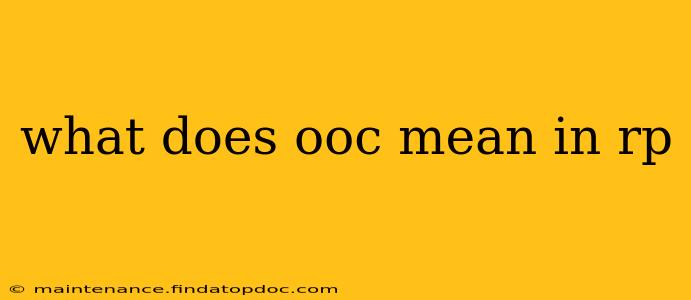What Does OOC Mean in RP?
The acronym "OOC" is frequently used in online role-playing (RP) communities and stands for Out Of Character. It's a crucial term that helps distinguish between actions and statements made within the role-playing context (in-character or IC) and those made by the players themselves outside of their established character personas.
Understanding the difference between IC and OOC is fundamental to a positive and successful role-playing experience. Let's delve deeper into this distinction and address some common questions.
What's the Difference Between IC and OOC?
In short:
-
IC (In Character): This refers to anything said or done within the confines of the role-play scenario. It's how your character would act, speak, and interact with other characters. Think of it as your character's "voice" and actions within the story.
-
OOC (Out Of Character): This is any communication that's not related to your character's persona or the fictional world of the role-play. It's essentially "you" talking to the other players, discussing aspects of the RP, or clarifying things outside of the story's narrative.
Why is the Distinction Between IC and OOC Important?
Maintaining a clear separation between IC and OOC communication is vital for several reasons:
-
Maintaining Immersion: Confusing IC and OOC statements can break the immersion and disrupt the flow of the role-play. If a player suddenly starts giving away plot details or discussing real-world matters during an intense scene, it pulls everyone out of the established fictional reality.
-
Avoiding Confusion: Clearly labeling communications prevents misunderstandings. Knowing whether a statement is made by the character or the player avoids ambiguity and keeps the storyline coherent.
-
Respecting Boundaries: Some role-playing communities have specific rules about meta-gaming (using OOC information to gain an advantage within the RP). Clearly distinguishing IC and OOC interactions prevents accidental meta-gaming and ensures fair play.
-
Managing the Narrative: OOC discussions are often necessary for collaboration, planning events, or resolving conflicts related to the role-play itself. These discussions are best kept separate from the IC narrative.
How is OOC Used in Practice?
In many RP communities, players might preface their OOC statements with "OOC:" or "(OOC)" to clearly distinguish them. For example:
- IC: "My character bravely charges into battle, sword flashing."
- OOC: "(OOC) Should we have a battle scene here, or move the plot somewhere else?"
Some platforms and RP systems might use different methods to separate IC and OOC chat, such as dedicated channels or color-coded text.
Other Frequently Asked Questions:
What if I accidentally mix IC and OOC? It's not uncommon. Simply apologize and clarify your intentions. Good RP communities are understanding, and a simple correction usually suffices.
Can I use OOC to ask for help understanding something in the RP? Absolutely. It's always better to clarify things OOC than to make assumptions or disrupt the narrative with confused in-character actions.
Is it rude to only use OOC? Yes. If you constantly break immersion by speaking only outside the character, you are not actively participating in the role-play and could be disrupting the fun for others.
In conclusion, understanding the difference between IC and OOC is paramount for engaging in a fulfilling and collaborative online role-playing experience. By maintaining a clear separation and using appropriate signaling, you'll contribute to a more enjoyable and immersive RP for everyone involved.
